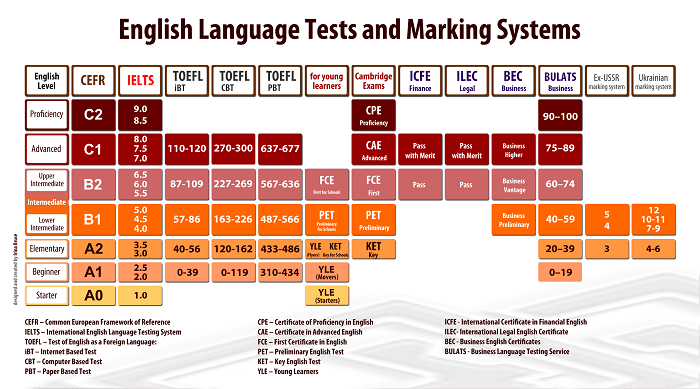Nowadays, more and more people are taking international exams in English. The choice of the exam itself depends on the needs of the students, some need a certificate to confirm their own level, some for work, study or immigration, and some for a successful career.
Below, we have collected information about the main systems for assessing knowledge of the English language and their features.
IELTS (International English Language Testing System)
Has 4 sections: Speaking, Listening, Reading and Writing. IELTS results are recognised in more than 140 countries around the world and are accepted by all educational institutions. All modules are evaluated on a scale from 0.0 to 9.0 points, with a step of 0.5 points from which the Overall Score Band is formed. When applying to level 6-7 programs, you need a total score of 6.0 (not less than 5.5 for each section), for admission to level 8-9 programs, you need a total score of 6.5 (not less than 6.0 for each section). The certificate is valid for 2 years.
TOEFL (Test of English as a Foreign Language)
It is a standardised test of knowledge of the English language (in its North American version), the passing of which is mandatory for non-English-speaking foreigners to enter universities in the USA and Canada, as well as in Europe and Asia. American tests: TOEFL (iBt, CBT, PBT), TOEIC.
Has 4 sections. The certificate is valid for 2 years, however, in some universities, it is required that the test was passed no more than 18 months ago. For admission to diploma programs in New Zealand, an overall score of 60 is required for level 7 programs and an overall score of 79 for programs of level 8 and above.
NZCEL (New Zealand Certificates in English Language)
New Zealand Academic Program. In addition to the general blocks of preparation and assessment of knowledge, the program prepares the student for the educational process in the country’s higher educational institutions. The certificate is only accepted by educational institutions in New Zealand. NZCEL level 4 is analogous to IELTS 6.0, NZCEL level 5 is analogous to IELTS 6.5. Upon successful completion of the program, you do not need to retake IELTS for admission.
Learn more about the features of NZCEL in our article.
Cambridge Exams
a group of English language exams conducted by the University of Cambridge Examination Board (UCLES).
The General English exam set has a five-level system:
- KET (Key English Test)
- PET (Preliminary English Test)
- FCE (First Certificate in English)
- CAE (Certificate in Advanced English)
- CPE (Certificate of Proficiency in English)
A series of professional tests for businessmen, lawyers and financiers: BEC, BULATS, ILEC, ICFE.
- BEC (Business English Certificates)
- BULATS (Business Language Testing Service)
- ILEC (International Legal English Certificate)
- ICFE (International Certificate in Financial English)
Most programs at level 7 and above require a C1 certificate (CAE). The test has similar 4 academic sections + an additional section Use of English, assesses the knowledge of grammar, the ability to competently and appropriately use language structures. The certificate is valid for an unlimited period.
PTE (Pearson Tests of English)
International exam in English for people who are not native speakers. Having passed the PTE and gaining a certain point, you can enter foreign educational institutions and present when applying for a job, as it is recognised in many countries of the world.
The PTE certificate has no statute of limitations, which gives it a significant advantage over IELTS. However, you need to be prepared for the fact that admissions committees of foreign universities may require “fresh” results of language exams (no more than 2 years from the date of testing).
The test is completely carried out on a computer, which is undoubtedly an advantage since the result depends only on your real knowledge and not on the mood and subjective assessment of the examiner. For admission to level 7 programs, you must score 50 points. For programs of level 8 and above – 58 points.
Learn more about PTEs in our article.
LanguageCert
Previously, the LanguageCert International ESOL exam could be taken online. However, starting from July 2025, the online/home version of the test are no longer accepted in New Zealand, in accordance with NZQA requirements.
If you are planning to study in New Zealand or the United Kingdom, it is worth considering the LanguageCert International ESOL test as an alternative to IELTS.
Unlike IELTS, when booking LanguageCert you must choose the exam level in advance. The test is available from B1 to C2. You can schedule the written and oral exams either on the same day or separately.
More details about LanguageCert in our full article.
Duolingo English Test
Duolingo is a U.S.-based EdTech company launched in 2011. It offers free and user-friendly language learning through a gamified app available on iOS, Android, and web platforms. In 2016, Duolingo introduced the standardized online Duolingo English Test (DET), which has since become an alternative to traditional tests such as TOEFL and IELTS.
The Duolingo English Test is based on the principle of adaptive computer testing. This means that tasks adjust to the candidate’s proficiency level: the better the answers, the more challenging the questions become. Each exam is unique, as the sequence of tasks is generated individually.
Many universities in New Zealand (including Otago, Massey, Victoria University of Wellington, University of Waikato, Lincoln University, and others) accept the DET certificate with a score equivalent to the IELTS requirement for admission — usually around 110–120 points.
You can check which universities accept DET here (be sure to specify your study program when applying filters).
Read more details about Duolingo English Test in our article.
The comparative characteristics of English language assessment systems are provided below to show the approximate ratio between English proficiency and grades.




